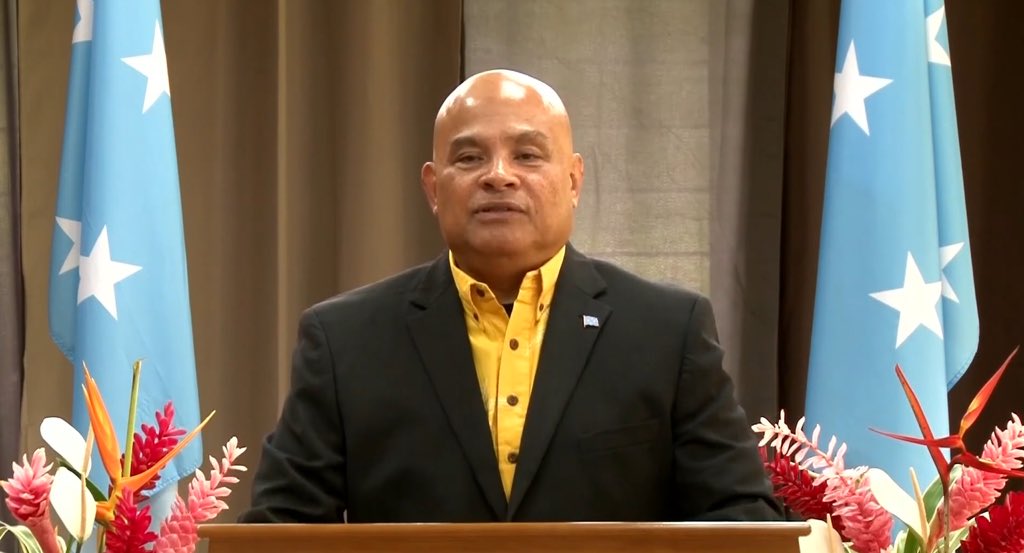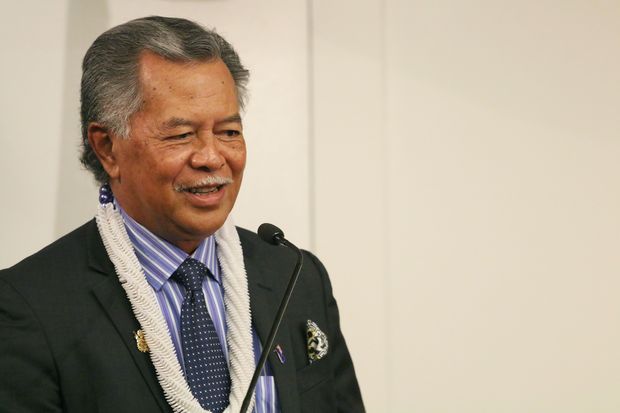A top Micronesian leader says Pacific Islands Forum (PIF) secretary-general Henry Puna will quit the position in order to stop the key regional diplomatic body from splitting.
Micronesian countries have been locked in an acrimonious dispute with other members of the Pacific Islands Forum over last year’s contested leadership ballot, which saw Puna narrowly defeat Micronesia’s candidate, Gerard Zackios.
Micronesian countries said that was in breach of a “gentleman’s agreement” to hand them the position, and began the process of withdrawing from the forum.
But leaders and officials from a host of Pacific Island countries, including Australia and New Zealand, have spent months in quiet discussions trying to heal the rift.
On Saturday — just two days before his country’s exit from PIF was due to formally take effect — the President of the Federated States of Micronesia (FSM) David Panuelo issued a shock statement saying all Micronesian countries had decided to “temporarily rescind” their withdrawal because of “reforms” promised by the forum.
On Monday, Panuelo told the ABC’s Pacific Beat that under the agreement, current PIF chair Fiji had promised that Puna would step down in June this year and make room for a Micronesian candidate.
“That’s one of the reforms, among others, and I think it’s the most hardline [position] all of us had taken on as Micronesian leaders, because if the Pacific Islands Forum is to continue with credible unity, those reforms … have to be met,” he said.
Palau President Surangel Whipps Junior told the ABC that Micronesian leaders were last week asked to pause their withdrawal from the forum and were given “confirmation” their requests would be honoured, including the appointment of a Micronesian representative to the position of secretary-general.
“We finally got word … that the position of Micronesia will be honoured and the SG will be changed and reforms will happen in the Forum,” President Whipps said.
“It’s nothing personal against the current secretary-general. It’s all about honouring commitments, rebuilding trust and working together as a Pacific.”
President Whipps said if reforms did not occur by June, Micronesian countries would complete their withdrawal from the PIF.
“It means that we’re done, we will move on. The forum did not honour their commitments,” he said.
Panuelo said resolving the leadership issue would allow Pacific Island nations to move on from the PIF leadership dispute and focus on more important issues, like COVID-19 and climate change.
Panuelo also said he was confident other Pacific Island nations and the PIF leadership would deliver what they had promised.
“We would not have been confident or decide unanimously to have this temporary pause [of our withdrawal] if we don’t have confidence,” he said.
“It’s good to have the good faith and trust that these things will materialise in [the] time we’ve indicated [by June],” he said.

The deal has not yet been confirmed by the Pacific Islands Forum Secretariat, or by Fiji’s government.
The ABC has approached both for comment.
“The Forum Secretariat is unable to make any comments on the High Level Political Dialogue, which is ongoing,” it said.
But if the agreement stops the Pacific Islands Forum from splitting, it will be a source of relief in capitals across the region.
Australian officials worried that the breakdown of the Forum would be politically destabilising, while Pacific leaders said splitting PIF would undermine Pacific efforts to campaign collectively on critical issues like climate change.
Panuelo said several major countries in the wider region — including the United States, China, Japan, Australia and New Zealand — had pressed Pacific leaders to keep the forum united.
He also indicated that several political heavyweights, including Fiji’s Prime Minister Frank Bainimarama, Papua New Guinea’s Prime Minister James Marape and Nauru’s President Lionel Rouwen Aingimea, had been heavily involved in negotiations to find a solution to the dispute.
And while Panuelo is still keen for Zackios to take the position, he said that Micronesia had been asked to put forward two candidates for the role.
Tess Newton Cain, who is the Project Lead of the Griffith Asia Institute’s Pacific Hub, said it was “possibly a bit surprising” to see Panuelo lay out the deal in so much detail before it had been formally announced.
But she said that PIF was now entering “uncharted waters” and some other countries may worry about the precedent set by the deal.
“Once this has happened, there’s always a sense of what happens next time? If Melanesia wants their candidate, would they go down this route as well?” she said.
“Having said that, as we know, the whole process of appointment of the secretary-general is under wholesale review.
“So what’s happened now will feed into this … in terms of developing a new process for appointing the SG, which means we hopefully don’t have to go through this again,” she said.
SOURCE: ABC/PACNEWS














